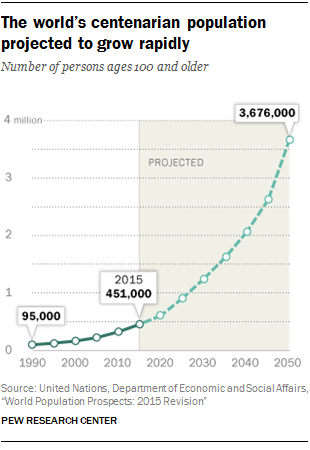 In Part 1, we considered how gains in childhood mortality affect the calculation of life expectancy, as well as how birth conditions influence your odds of living to an old age.
In Part 1, we considered how gains in childhood mortality affect the calculation of life expectancy, as well as how birth conditions influence your odds of living to an old age.Now, let's look at some interesting things at the other end of the age spectrum.
First, let's visit the "mortality plateau". This is not an actual rock formation (at least I couldn't find one, the closest I got was the "Death Canyon Shelf")
What I am referring to is an intriguing phenomena at old ages.
As we age, we have a greater chance of dying. Not only that, the pace of the increase also increases. It's like a ball rolling down hill, picking up speed as it goes.
But at the oldest ages, the momentum seems to stop. In some cases, it even seems to slow down.
Some longevity scientists say that this is just noise in the data. Others say it may be an actual thing. Maybe the people that make it this far in life may have a certain resistance to diseases of aging.
Whether data noise, or something biological, we will get more and more opportunities to figure this out. For those so inclined, you may be interested in the International Database on Longevity.
There are more elderly people than ever before, and most projections predict a continued increase.
What are these old-timers up to?
Look to the sky! It's a bird, it's a plane, it's a skydiving centenarian!
And here on the ground, they are running laps around age records. There's Hurricane Hawkins and Ida Keeling showed that "Can't Nothing Bring [Her] Down" setting records for a few years after her hundredth birthday.
I'm excited to see what records will continue to be broken by centenarians.
While many aging adults are also more active and healthier than ever, unfortunately a good amount are surviving longer in a state of sickness.
One driving factor of this issue is that we are getting better at disease treatment faster than disease prevention.
Another element to consider is that as we get better at early detection and treatments of things like cancer, we expose more people to other chronic conditions like diabetes or dementia.
Symposiums like the Society of Actuaries "Living to 100" and and organizations like the International Federation on Aging continue put a lot of research and attention on these issues.
As we explore the path to living well into our triple digits, will we be able to expand the human lifespan indefinitely? How far can we go?
People like Peter Diamandis and Aubrey DeGrey, seem to think that technology will allow us to perpetuate life, perhaps indefinitely. Although, it may be a very interesting state of being. As you may be a walking preservative, or perhaps a cyborg. Most optimistically, you will just be a renewed version of yourself, effectively tricking your body to think it is 60 when it is really 160.
Without technology, what is possible? In order to answer this, we will have to explore the various theories of aging, which will be the next post in this series. Why do we age? The short answer is that we don't really know. There are other really old living things in the world (trees, tortoises, etc.) and so it seems like unending life may be achievable somehow. Why not for us?
In the meantime, we still have to face tough questions about aging, and the costs of people keeping people alive. A while back I heard an intriguing podcast episode from Freakonmoics called "Are You Ready For a Glorious Sunset?" that wrestles with some of the ethics of preserving life.
Till next time, call your grandma and tell her you love her. Or consider adopting a grandma. Connecting with our elders and hearing their stories may be helpful for you and for them.
And stay tuned for more contemplation on longevity.

